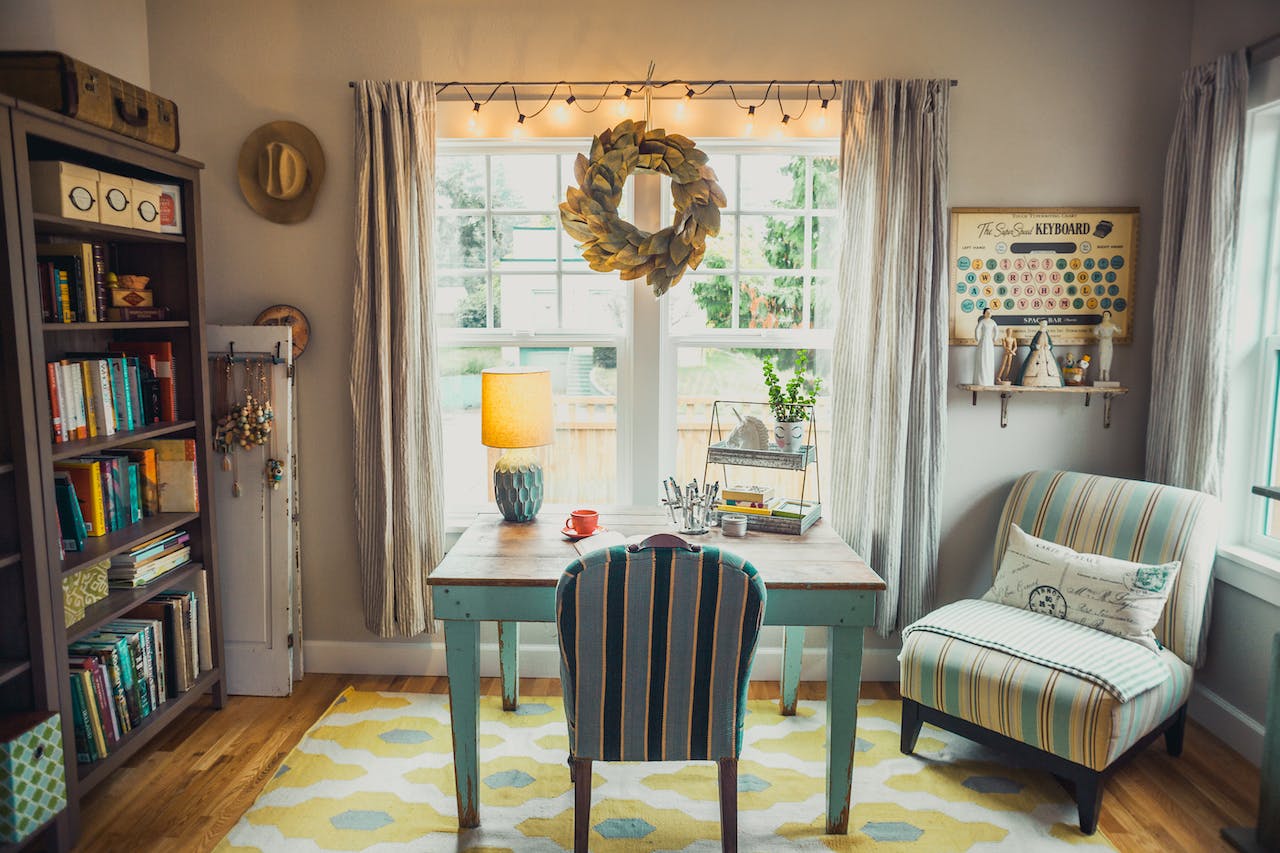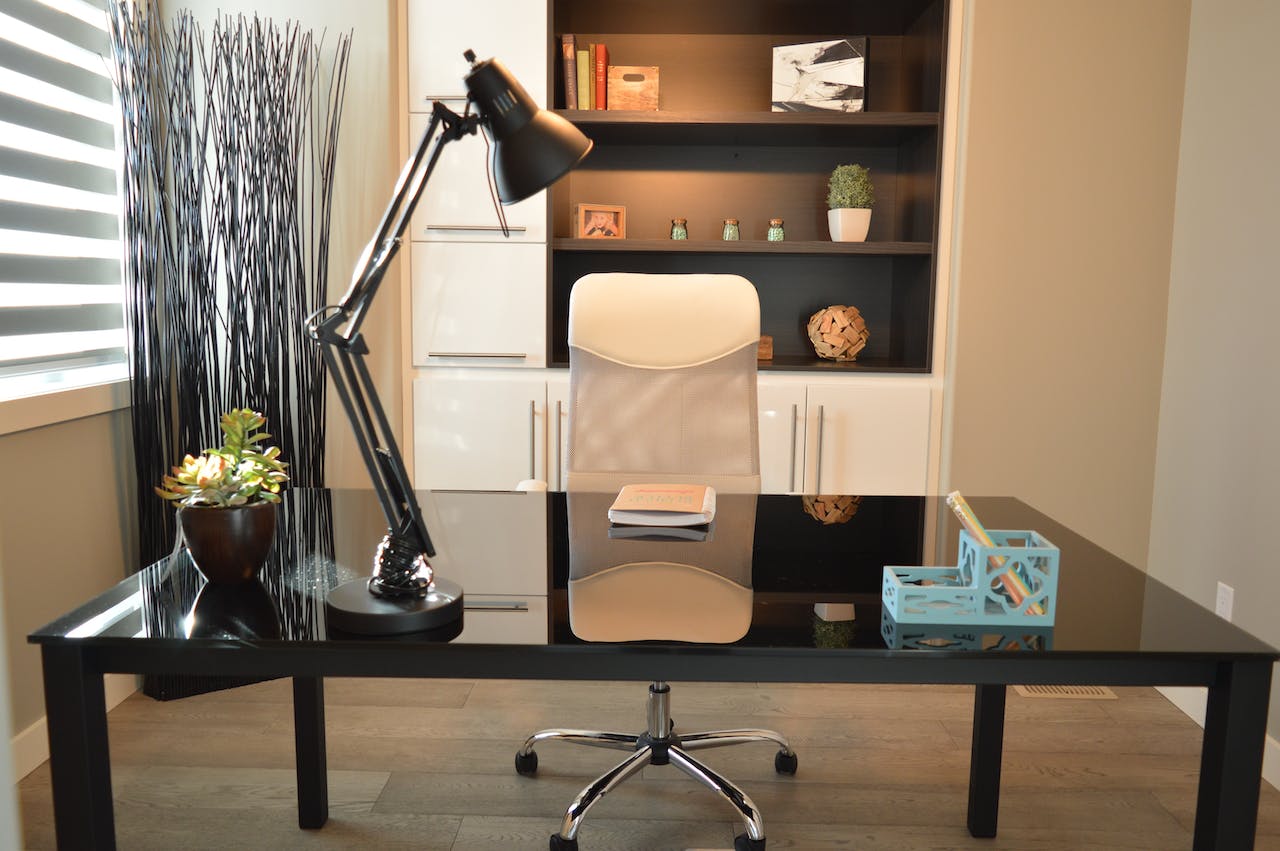How to Set Up a Successful Real Estate Home Office
A Guide to Setting Up a Real Estate Home Office
A Guide to Setting Up a Real Estate Home Office

Jacqueline Kyo Thomas
As a new real estate agent, you're on the cusp of something great — a career filled with potential, growth, and the thrill of making dreams come true. Your home office is much more than a workspace. It's your strategy hub where you make big deals and connections with clients that may last a lifetime. And that’s why you must invest time and thought into setting up your home office. You need a base to support your goals and ignite your productivity.
Creating your home office goes beyond picking out a sleek desk or the latest tech gadget. By thoughtfully designing your home office, you can bolster your confidence, streamline your workflow, and harmonize your work/life balance. Whether you're finalizing contracts, hosting virtual tours, or gearing up for the next big showing, your home office is a supporting cast member.
This guide is your roadmap to constructing a home office you’ll love. We're diving into 12 essential tips to make a space uniquely yours and especially efficient. Let’s get started.
Location, location, location. It’s not just for finding your clients the perfect property—it’s also for finding you the perfect place to be productive in your home.
Your home office is more than just a desk and a chair. It's the command center for your real estate business. Picking the right spot in your home is about balancing comfort, functionality, and professionalism. And it starts by choosing the perfect location. Here are some tips to help you with that:
What’s your ideal environment? Do you thrive in absolute silence, or do you prefer a little background noise? Start by identifying your most productive environment. If you can't concentrate with the slightest sound, you'll want to choose the quietest part of your house.
Lighting also matters. If possible, choose a naturally sunny part of your house. Natural light doesn't just save on electricity. It's also been shown to boost productivity and mood. A spot with plenty of natural light can make those long hours of paperwork a bit more pleasant.
Think about the flow of traffic through your home. Avoid high-traffic areas to minimize interruptions. A space with a door can be a real game-changer for privacy and sound control.
But don’t just regulate yourself to a tiny area that’s nestled in the back of your home. You need space too. Real estate requires a lot of paperwork. As a real estate agent, you’ll need room to store files, spread out documents, and display property information. Ensure your chosen location can accommodate your needs without you feeling cramped.
If you're living with others, setting boundaries is crucial. Make it clear that when you're in your office, you're 'at work' and shouldn't be disturbed. This might involve setting specific work hours and communicating these hours to everyone in your home.
Selecting the right location for your home office sets the stage for your success in real estate. Once you've nailed down the perfect spot, you'll be ready to tackle the next steps in setting up your home office.

In real estate, you spend a lot of time at your desk, whether you're closing deals, conducting market research, or connecting with clients. When shopping for office furniture, focus on your comfort and long-term health. Some office furniture looks nice but cam have a deleterious effect on your body, especially your back. Here's how to choose the right pieces:
Your chair is arguably the most critical piece of furniture in your office. Look for one with adjustable height, lumbar support, and the ability to recline slightly. This helps maintain proper posture and reduce back strain.
If possible, try before you buy. You'll spend hours in this chair, so it needs to be right. A good chair can be an investment, but considering the amount of time you'll use it, it's worth every penny.
Sitting all day isn't ideal for your health. A standing desk, or an adjustable desk that allows you to switch between sitting and standing, can be a game-changer. It can increase your energy and reduce the risk of the health issues associated with prolonged sitting.
Also, keep an eye out for storage. Ensure your desk has enough space for your computer, documents, and anything else you need to have at hand. Desks with built-in storage can help keep your workspace tidy and organized.
Keep frequently used items within arm's reach. This might include your phone, notepad, or planner. Less frequently used items can be stored away to reduce clutter.
Also, prioritize desks that have cable management solutions. Desks can quickly become tangled with cables. If not built-in to your desk, you can also buy cable organizers to keep them under control. This not only looks better but also helps prevent accidents or equipment damage.
Consider accessories like a quality desk mat, a comfortable wrist rest, or an ergonomic mouse. These can make your workspace more comfortable and reduce the risk of strain or injury.
Choosing the right furniture isn't just about creating a professional image. It's about creating a space where you can work effectively and comfortably, day in and day out. With the right chair and desk, your home office can be a place where you can focus on your clients' needs and grow your real estate business.
Room lighting is also important.
Lighting plays a pivotal role in creating a conducive work environment. It affects not just visibility but also your mood and energy levels. Here's how to get your office lighting just right:
If possible, position your desk to take advantage of natural light. Being near a window not only provides you with a view but also fills your space with warm, natural light, which can boost your mood and productivity.
While natural light is beneficial, too much direct sunlight can cause glare, making it difficult to see your computer screen. Use adjustable blinds or sheer curtains to control the amount of light coming in.
Start with a good overhead light that illuminates the room evenly. It's the base layer that ensures you have sufficient light at any time of the day.
You also need task lighting. A desk lamp is essential for task lighting. It focuses light exactly where you need it, be it on your paperwork or keyboard. Choose a lamp with adjustable brightness and direction to customize your lighting based on the task at hand.
Finally, consider adding some accent lighting, like wall sconces or floor lamps, to soften the space and add warmth. Accent lighting makes your office a more inviting place to work.
Did you know that the color temperature of your bulbs can significantly affect your focus and energy? Bulbs with a cooler, bluer light are great for concentration and alertness, especially in the morning. Warmer, yellower lights are soothing and ideal for late afternoons or evenings.
Eye strain is a real possibility, especially if you’re focusing on tiny text throughout the workday. Set up your home office to support healthy eyes. Position your lights and your monitor to avoid shadows and reduce glare. Your light source should be in front of or beside you, not behind.
Also, take breaks. Regular breaks away from your screen help prevent eye strain. Follow the 20-20-20 rule: every 20 minutes, look at something 20 feet away for at least 20 seconds.
Getting your lighting right can transform your workspace to an environment where you can be your most productive, energetic self.

These days, you’re highly likely to interact with your clients virtually at some point. Your background during video calls becomes an extension of your professional image. Here's how to ensure it reflects your standards and professionalism:
Opt for a clean, uncluttered background. A plain wall, a bookshelf with neatly arranged books, or a corner of your office with tasteful decor can serve as excellent backdrops. Remove distractions from the frame, like clutter, moving objects, or bright windows that can create glare or backlighting issues.
Position yourself so that you're facing a light source, ideally a window with natural light. This ensures your face is well-lit and clear on the screen.
You can also use additional lighting to eliminate shadows on your face. A ring light or a simple desk lamp can provide the extra illumination needed for a professional look.
If possible, incorporate your company logo or brand colors into your background subtly. This could be through a branded poster, a mug on the desk, or even the color of the wall or accessories. Items like a model home, awards, or a stack of real estate magazines can subtly convey your dedication and success in the industry.
Ensure your webcam is at eye level and the camera quality is good. This makes the conversation more engaging and personal and prevents viewers from looking up your nose.
Also, test your microphone before important calls or videos to ensure you’re heard clearly. Consider using a headset or external microphone for better sound quality. This is especially necessary if your home office has an echo or background noise.
Your video call background and setup say a lot about your professionalism and attention to detail. With a well-thought-out backdrop and a good technical setup, you'll convey confidence and credibility.
Congratulations! You're now equipped with the know-how to create a home office that supports your burgeoning real estate career. Remember, your home office is a reflection of your professionalism and a sanctuary where your business goals turn into reality.